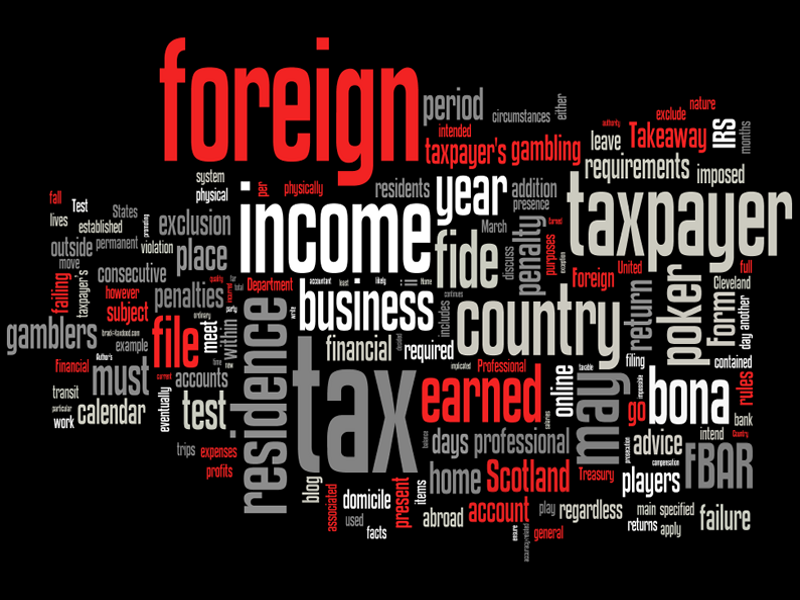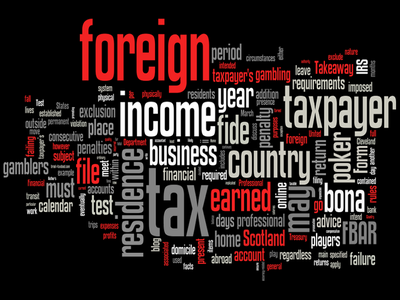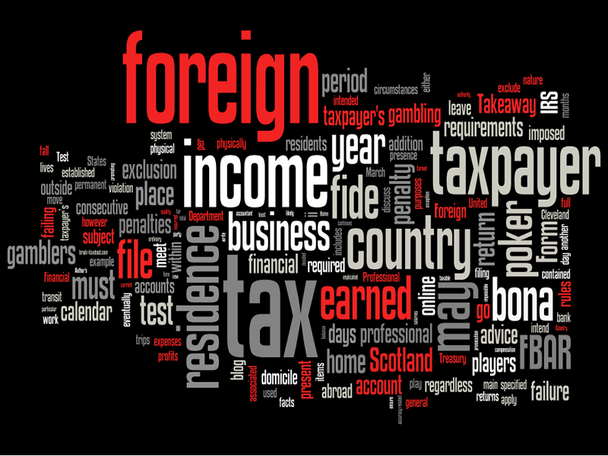


Since Black Friday, many poker players in the US have decided to leave the country to continue playing online poker. Canada, Costa Rica, and Mexico are just a few of the popular landing places. US residents who move outside the country do not leave behind their US tax obligations, however.
Takeaway #1: US residents who move abroad to play online poker are still subject to US income tax.
The US income tax system is a “worldwide” system: Income tax is imposed on the income of US residents from all sources, regardless where it is earned. Online gambling winnings are no exception.
Takeaway #2: Professional poker players may be able to exclude from US income tax some gambling income earned abroad.
For the 2011 tax year, a taxpayer who qualifies for the foreign earned income exclusion may exclude up to $92,200 of foreign earned income.
Amateur gamblers cannot apply the foreign earned income exclusion to gambling income. “Earned income” is a statutory term; it includes items such as wages, salaries, tips, and other employee compensation, as well as business profits earned from a professional occupation. Unlike amateur gamblers, professional gamblers are considered self-employed and earn business profits.
To qualify for the foreign earned income exclusion, the taxpayer must be a US resident who (a) has a “tax home” in a foreign country; AND (b) meets either the (i) bona fide residence test or (ii) physical presence test. I will discuss each of the requirements in turn.
A. Tax Home in a Foreign Country
The tax home is the general area of the taxpayer’s main place of business, regardless where the taxpayer lives. If the taxpayer does not have a main place of business because of the nature of the work, then the tax home may be where the taxpayer regularly lives.
Professional gamblers who find a regular place to live outside of the US and play online poker from there may meet the tax home test.
B(i). Bona Fide Residence Test
To meet this test, the taxpayer must establish a bona fide residence in a foreign country for an uninterrupted period that includes an entire tax year. The determination is based on the taxpayer’s facts and circumstances. Some important factors include intent, purpose, and the nature and length of the taxpayer’s stay abroad.
Note that a taxpayer may leave the foreign country for temporary trips back to the US during the period of bona fide residence and not be disqualified. The taxpayer should have a clear intention of returning from such trips either to the foreign residence or to a new bona fide residence in another foreign country.
Also, a bona fide residence is not necessarily the same as the taxpayer’s domicile. A domicile is the taxpayer’s permanent home, or the place to which the taxpayer always returns or intends to return. Here’s an example to illustrate:
You could have your domicile in Cleveland Ohio, and a bona fide residence in Edinburgh, Scotland, if you intend to return eventually to Cleveland.
The fact that you go to Scotland does not automatically make Scotland your bona fide residence. If you go there as a tourist, or on a short business trip, and then return to the United States, you have not established bona fide residence in Scotland. But if you go to Scotland to work for an indefinite or extended period and you set up permanent quarters there for yourself and your family, you probably have established a bona fide residence in a foreign country, even though you intend to return eventually to the United States.
B(ii). Physical Presence Test
To meet the physical presence test, the taxpayer must be physically present in a foreign country at least 330 full days during a period of 12 consecutive months.
In general, a full day is what it says. The day a taxpayer leaves the US to go directly to a foreign country or returns to the US from a foreign country does not count. If the taxpayer is in transit between two points outside the US and is physically present in the US for less than 24 hours, however, the taxpayer is not treated as present in the US during the transit for purposes of this test.
The 330 days do not have to be consecutive, and they do not have to all fall within a calendar year. For example, the period of 12 consecutive months may run from March 1, 2011 to February 29, 2012.
There are far more rules and restrictions concerning the foreign earned income exclusion than I can cover here. IRS Publication 54 is a good place to start for more information.
Do not forget that professional gamblers may deduct “ordinary and necessary” business expenses incurred in connection with gambling. I covered some of these items in a previous post. The rules for deducting business expenses apply regardless of whether the associated business income is earned within the US or not.
Takeaway #3: Poker players who open a bank account in a foreign country may be required to file with the US Department of the Treasury Form TD F 90-22.1, Report of Foreign Bank and Financial Accounts (“FBAR”).
A US person who has a financial interest in or signature authority over foreign financial accounts must file an FBAR if the aggregate value of the foreign financial accounts exceeds $10,000 at any time during the calendar year. The FBAR must be received by the Treasury Department no later than June 30 of the following calendar year.
Do not confuse a bank account with an online poker account. As previously discussed, the latter likely does not fall within the scope of the current FBAR rules.
The penalty for willfully failing to file the FBAR for a given tax year can be as high as the greater of $100,000 or 50% of the total balance of the foreign account per violation. Non-willful violations that the IRS determines were not due to reasonable cause are subject to a $10,000 penalty per violation. These possible penalties are separate and in addition to penalties that may be imposed for failing to report any taxable income associated with the accounts (e.g., failure to file, failure to pay, 20% accuracy-related penalty, etc.).
Takeaway #4: In addition to FBAR filing requirements, for tax years ending on or after March 18, 2010 (for calendar year filers, 2011 is the first tax year implicated), poker players owning specified foreign financial assets in excess of a specified threshold amount may be required to file Form 8938, Statement of Specified Foreign Financial Assets.
Form 8938 is filed along with a taxpayer’s tax return, and is in addition to FBAR filing requirements. The civil penalty for failing to file Form 8938 if required is $10,000, with additional penalties of $10,000 of each 30 days the failure to file continues after the initial 90 days, with a maximum penalty of $50,000. Willful failure to file Form 8938 is subject to criminal prosecution.
Author’s note: I must remind all readers that it is impossible to offer comprehensive tax advice on the internet. Information I write on this blog is not legal advice, and is not intended to address anyone’s particular tax situation. Should you seek such advice, consult with a tax professional to discuss your facts and circumstances.
IRS Circular 230 Notice: To ensure compliance with requirements imposed by the IRS, I inform you that any US federal tax advice contained in this blog is not intended or written to be used, and cannot be used, for the purposes of (i) avoiding penalties under the Internal Revenue Code or (ii) promoting, marketing or recommending to another party any transaction or matter that is contained in this blog.

